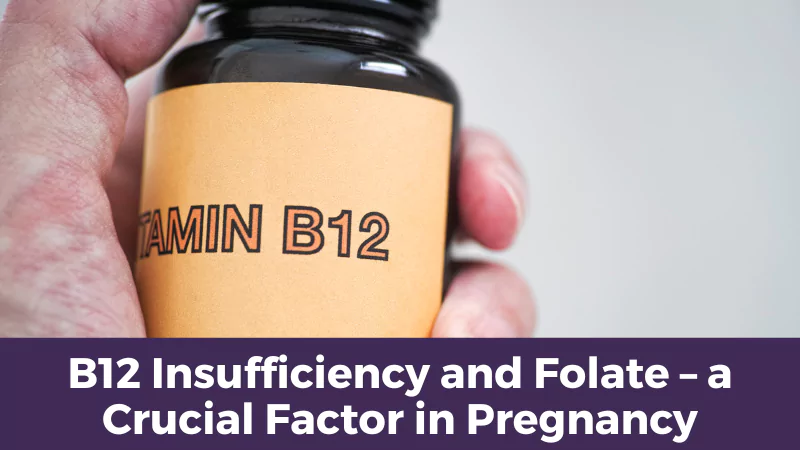We already know that vitamin B12, or cobalamin, is an essential nutrient for pregnancy, because it is important for cell growth and baby development. Specifically, B12 works together with folate for the syntheses of DNA, RNA, lipids and proteins inside the cells. Most importantly, B12 and folate are both critical in homocysteine metabolism, DNA methylation, and neuro-transmitter synthesis; and B12 deficiency is related to excessive sweating, anaemia, dementia, and cognitive dysfunctions.
1. B12 and Pregnancy
Surprisingly, insufficient vitamin B12 is prevalent in pregnant women as reported by a cohort research from Canada, and 2 out of 10 pregnant women may suffer from insufficient B12 in their blood, even though they are taking B12 supplements. This report breaks the conventional view that “B12 deficiency was unlikely” because of its water-soluble feature and rich sources from diets. These pregnant women were taking vitamin B12 supplements above the current recommended B12 does for pregnancy and with widespread B12 supplement use. Other research reports confirm the Canadian finding. This is worth noting because the pregnant women with insufficient B12 included either vegetarians or non-vegetarians, and vegetarians are considered a group with an even higher risk because of their vegetarian diets. Given the growing trend among women to favour vegetarian diets, and the importance of B12 in pregnancy, these current findings need our attentions. The findings give multiple warning signs to us, and one of them is the current recommended B12 dose for pregnant women is too low, or at least insufficient.
One of the reports evaluated the most recent 57 publications about the impact of insufficient vitamin B12 in pregnant women on low birth weight of babies, and found that the B12 insufficiency trend increases from the first trimester to the third one. This means that the B12 insufficiency is getting worse during the pregnancy and baby development, and the later stage of the pregnancy the lower levels of B12 will be in pregnant women. The report also shows that lower B12 levels in pregnant women is related to lower birth weight, even though the lower B12 levels were not statistically significant. This means there is a higher chance to have a baby with lower birth weight if the B12 intake is not enough during pregnancy, besides many other negative consequences.
2.B12 and Pregnancy Masking B12 Insufficiency a Crucial Factor
We now learn that B12 insufficiency in pregnant women is not as rare as we thought years ago. Scientific studies found that the water-soluble B12 insufficiency can increase the risk of neural tube defect, anaemia, and cognitive dysfunctions. This indicates that B12 has very close relation with folate. Indeed, B12 and folate interact in the metabolism of methyl group in the transform from 5-MTHF to homocysteine, and this reaction is mediated by B12 dependent methltransferase, which results in the formation of methionine. These processes mean either folate or B12 insufficiency can cause higher homocysteine level in the blood, anaemia and other health issues, because they both interrupt the one carbon metabolism. So it does not matter if the folate or B12 insufficiency is caused by genetic defects or by nutritional deficiency, the results are similar or the same.
Most importantly, folate and B12 deficiencies may enhance each other’s negative impact. In this case, the deficiency from either of them alone will be better than having both of them, because having both will make the consequences more severe. For example, higher homocysteine in elders can cause anaemia and cognitive impairment, which can be enhanced by B12 deficiency. Moreover, Excessive folic acid is related to autism as found by Johns Hopkins Bloomberg School of Public Health in the U. S., and excessive B12 will increase this autism risk. When both insufficiencies happen in pregnant women, it may cause extraordinarily high homocysteine level in the blood and results in harmful effects to the babies.
On the other hand, the negative impact from excessive folic acid may be enhanced by B12 insufficiency. Reports show that too much folic acid supplement has raised safety concern due to its adverse outcomes. These adverse clinical outcomes caused by excessive folic acid intake can be enhanced by low or insufficient B12 intake. The current understanding of excessive folic acid and its negative consequences, such as cancer and cognitive impairment, have been linked to B12 deficiency.
Furthermore, folic acid supplement can mask the symptoms of B12 insufficiency, which means the intake of folic acid may makes the B12 insufficiency symptoms invisible but they still exist in the body.1 Folic acid may cause misunderstanding that there is no B12 insufficiency, even though it is there. To prevent this from happening, B12 level in the blood needs to be checked before taking folic acid as supplement in pregnant women or any other populations.
3. Differences of B12 Impact on folic acid vs folate – folinic acid and 5-MTHF in Pregnancy
Since pregnant women have higher requirements of folate, it is important to know and understand the differences between folic acid and folate in supplementation, when it comes to vitamin B12 insufficiency. Folate intake is important for pregnant women, particularly in the preconception stage; but the safer dietary folate is ineffective for pregnant women due to the higher demands from pregnancy. We showed previously that folic acid is a synthetic compound with no biological functions until it is transformed to functional folate inside the body, and thus it causes higher level of unmetabolised folic acid in the blood with harmful effects. , From this blog, we learn that folic acid also mask the symptoms of B12 deficiency, and may cause misunderstanding that we do not need additional B12, even when we do need it.
On the other hand, folate such as folinic acid and methyl folate (5-MTHF) is better than folic acid, particularly 5-MTHF, because 5-MTHF is a natural form and better alternative or replacement of folic acid. The benefits from 5-MTHF can be summarized as 1) it is a natural form of folate in the body with no need of transform, and it is ready to be used by the body; 2) it induces higher folate concentration within a shorter time in the blood stream, so it works faster and takes effect earlier; 3) it causes much lower level of or does not cause higher level of unmetabolised folic acid, and thus is much safer than folic acid, even when it is overdosed; and 4) most importantly, it does not mask the symptoms of B12 insufficiency.1,13
When we take in more folic acid, it needs to go through folate metabolism to be transformed to an active form before it functions in the body. Since B12 is required for folate metabolism, B12 deficiency can cause a folate trap. In this case, supplemented folic acid can cover the clinical signs of B12 insufficiency, which may delay its diagnosis and treatment, and increase the risk of neurological complications. On the contrary, 5-MTHF can function without going through the folate metabolism because it is a natural and active form of folate. As such, 5-MTHF will not mask B12 deficiency.
Summary
As a take home message, this blog renews current understanding of vitamin B12 insufficiency and its relation to folate insufficiency or overdose. On the one hand, B12 insufficiency enhance either folate insufficiency or overdose because they are both critical in the one carbon metabolism. On the other hand, folic acid supplement can mask the symptoms of B12 insufficiency and may delay its diagnosis and treatment. A better alternative and solution is 5-MTHF, and it is a natural form of folate. 5-MTHF works faster, more efficient, safer; and most importantly, it does not mask B12 insufficiency.
Practitioners, if you’d like to learn more about the different forms of B12, when each form is appropriate, the process for selecting the correct form of B12 for your patients and understanding the important role of B vitamins on a whole in the methylation cycle join me for my MTHFR and Prescribing webinar being held on the 27th of July. Click here for more details and to register your place.
Bibliography
[1] Visentin CE, Masih SP, Plumptre L, Schroder TH, Sohn KJ, Ly A, Lausman AY, Berger H, Croxford R, Lamers Y, Kim YI, O’Connor DL. Low Serum Vitamin B-12 Concentrations Are Prevalent in a Cohort of Pregnant Canadian Women. J Nutr. 2016 May; 146(5): 1035-42. PMID: 27075906
[2] Sukumar N, Rafnsson SB, Kandala NB, Bhopal R, Yajnik CS, Saravanan P. Prevalence of vitamin B-12 insufficiency during pregnancy and its effect on offspring birth weight: a systematic review and meta-analysis. Am J Clin Nutr. 2016 May; 103(5): 1232-51. PMID: 27076577.
[3] Moussa, H. N., Hosseini Nasab, S., Haidar, Z. A., Blackwell, S. C., & Sibai, B. M. (2016). Folic acid supplementation: what is new? Fetal, obstetric, long-term benefits and risks. Future Science. Retrieved from
[4] Selhub J, Paul L. Folic acid fortification: why not vitamin B12 also? Biofactors. 2011 Jul-Aug; 37(4): 269-71. PMID: 21674649
[5] Wadhwani NS, Patil VV, Mehendale SS, Wagh GN, Gupte SA, Joshi SR. Increased homocysteine levels exist in women with preeclampsia from early pregnancy. J Matern Fetal Neonatal Med. 2016 Aug; 29(16): 2719-25. PMID: 26552939
[6] Moore EM, Ames D, Mander AG, Carne RP, Brodaty H, Woodward MC, Boundy K, Ellis KA, Bush AI, Faux NG, Martins RN, Masters CL, Rowe CC, Szoeke C, Watters DA. Among vitamin B12 deficient older people, high folate levels are associated with worse cognitive function: combined data from three cohorts. J Alzheimers Dis. 2014; 39(3): 661-8. 24246419
[7] News Release. Too much folate in pregnant women increases risk for autism, study suggests. Johns Hopkins Bloomberg School of Public Health. Retrieved from http://www.jhsph.edu/news/news-releases/2016/too-much-folate-in-pregnant-women-increases-risk-for-autism-study-suggests.html
[8] Naithani M, Saxena V, Mirza AA, Kumari R, Sharma K, Bharadwaj J. Assessment of Folic Acid Supplementation in Pregnant Women by Estimation of Serum Levels of Tetrahydrofolic Acid, Dihydrofolate Reductase, and Homocysteine. Scientifica (Cairo). 2016; 2016: 1520685. PMCID: PMC4811260
[9] Selhub J, Rosenberg IH. Excessive folic acid intake and relation to adverse health outcome. Biochimie. 2016 Jul; 126: 71-8. PMID: 27131640
[10] Boyles AL, Yetley EA, Thayer KA, Coates PM. Safe use of high intakes of folic acid: research challenges and paths forward. Nutr Rev. 2016 Jul; 74(7): 469-74. PMID: 27272334
[11] Qian YY, Huang XL, Liang H, Zhang ZF, Xu JH, Chen JP, Yuan W, He L, Wang L, Miao MH, Du J, Li DK. Effects of maternal folic acid supplementation on gene methylation and being small for gestational age. J Hum Nutr Diet. 2016 May 27. PMID: 27230729
[12] News Release. Too much folate in pregnant women increases risk for autism, study suggests. Johns Hopkins Bloomberg School of Public Health. Retrieved from http://www.jhsph.edu/news/news-releases/2016/too-much-folate-in-pregnant-women-increases-risk-for-autism-study-suggests.html
[13] Obeid R, Holzgreve W, Pietrzik K. Is 5-methyltetrahydrofolate an alternative to folic acid for the prevention of neural tube defects? J Perinat Med. 2013 Sep 1; 41(5): 469-83. PMID: 23482308









